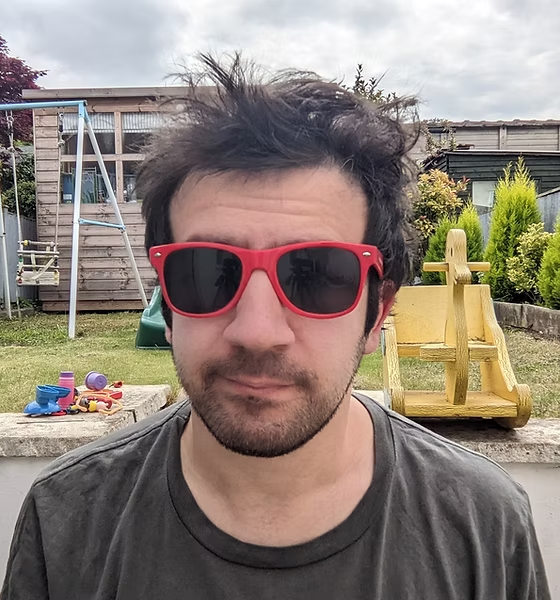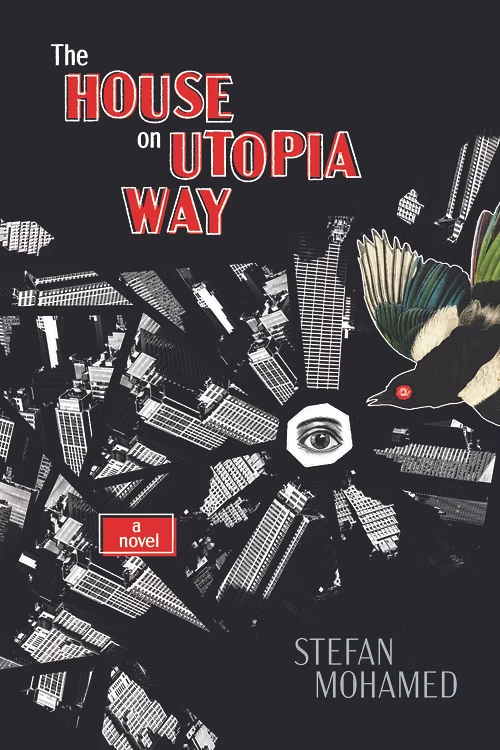Some Thoughts with ... Stefan Mohamed
27 Jun 2025The Author/s

Stefan Mohamed
My name is Stefan Mohamed. I am an award-winning author, poet, spoken word performer, creative writing tutor and freelance editor based in Bristol. I have also been known to make videos. And I DJ.
The Interview
1.- Could you introduce yourself to Jamreads’ readers?
Hi! I’m Stefan Mohamed, an author, poet and performer based in Bristol, UK. My first four novels, The Bitter Sixteen Trilogy and Falling Leaves, came out between 2015 and 2018 with Salt Publishing, and I’m now putting out my first self-published novel, The House On Utopia Way.
2.- When did Stefan Mohamed start writing?
When I was a child - I remember being six or seven and bashing out silly stories on my grandmother’s typewriter. Then when I was about eight I was given an old battered Amstrad word processor, taught myself to type properly, and I was away, writing stories and poems all the time. And whenever we were asked to write a story at school, they would be expecting maybe a couple of pages and I’d always write about ten. I can’t imagine any of it was any good, but it was excellent practise.
3.- Your first published series was Bitter Sixteen, how would you describe them?
It’s a YA superhero adventure about a cynical, socially awkward teenager called Stanly. When he turns 16 he develops the ability to fly and move things with his mind, and embarks on a series of increasingly twisted adventures with his talking dog Daryl, involving monsters, government conspiracies and parallel dimensions.
4.- Let’s talk about The House on the Utopia Way. How did the original idea appear?
I think it was around 2016 when I first started thinking about it. There was a lot of talk in the news about disinformation, troll farms and that sort of deliberate mass manipulation and radicalisation via the internet - which of course has totally gone away now and is no longer a problem at all. I was fascinated (and terrified) by this idea of people being so immersed in these different narratives that they were functionally living in a different reality to people who lived just down the street. It felt like an interesting backdrop for a story, and an opportunity to really let loose with loads of big, surreal ideas - I didn’t want to write a serious ‘state of the nation’ type book, I guess there is some social commentary in there but that was never the main intention, first and foremost I wanted it to be exciting and entertaining. And funny! As utterly horrific as things are now, there is often a very dark gallows humour to some of it.
5.- Let’s say that this novel is a bit chaotic/confusing due to its own nature. Did you use any method to keep the consistency/avoiding big plot problems?
I mainly wanted to make sure that the emotional arcs for the characters were coherent and consistent. Setting a story in this kind of fractured reality did mean that I could play with continuity errors, inconsistency and so on, and I did have fun with that. But I was as careful about mistakes as I would be writing any story, readers can always tell when something is deliberately chaotic and when the writer just isn’t in control! And I always kept the character journeys in mind as the most important thing - what effect does it have, living in such a broken, confusing world? How does it affect your sense of self, your sense of the people around you, your sense of reality? I did a lot of reading back and checking things just to make sure the big plot beats all fell in the right places, but my main concern was to keep the characters’ psychologies as grounded as possible.
6.- Why did you decide to write this kind of novel?
The fractured reality felt like a really fun playground to write in, as it gave me a kind of get-out-of-jail-free card to go as wild as I wanted! And I chose the detective noir style for a couple of reasons - first and foremost, it’s a fun genre, but it’s also a recognisable one, with lots of familiar tropes, and it’s one people are comfortable with from years of books and movies. So that meant I could explore some really out-there ideas, but within a structure that would make sense to readers, so they wouldn’t find themselves too lost at sea in all the craziness.
7.- You went on the self-publishing route with this one. Why you chose it?
I spent several years trying to get the book published traditionally, and got quite far along the process with two different publishers. But it eventually came down to selling the book - the editors really liked it, but the people in charge of sales and marketing thought it didn’t have enough commercial potential, and they weren’t sure how to market it. So eventually after a lot of setbacks, I decided to take matters into my own hands and put it out myself. It meant I could choose my own timetable, I wouldn’t have to spend months and months waiting for someone to email me back, and any failures would be my failures! So at least if it’s a huge flop, the buck stops with me and it’s an experience I can learn from.
8.- How would you pitch in 2 phrases this book?
A mind-bending mystery - full of lovable freaks and terrifying weirdos. Is that two phrases or one two-part phrase? I’m terrible at elevator pitches!
9.- Which other books would you recommend to people that enjoyed The House on the Utopia Way?
Voice of Our Shadow by Jonathan Carroll and Falling Out Of Cars by Jeff Noon were massive novels for me when I was a teenager, and the first time I really experienced books that played with fractured and broken realities, so I imagine they’ve had a lot of influence! Or if you want more wacky characters having wild adventures in a more grimy sci-fi setting, The Factus Sequence by Stark Holborn.
10.- What hobbies does Stefan Mohamed like to practise in his free time?
I’m not sure if this still counts as a hobby as I do get paid for it sometimes, but I love DJ-ing. It’s a really fun way to listen to music in a kind of active way, finding tunes that sound good together, putting them in a sort of narrative order. I can happily spend hours just mixing tunes in my living room. Either that or playing the piano, which I find very calming.
11.- What can we expect from Stefan Mohamed in the future?
Now that The House On Utopia Way is out, I finally feel able to think about a new big project. I’ve got a couple of works in progress that I’ve been tinkering with over the years but haven’t really got stuck into. So now I’m deciding what to work on next, which is a nice feeling - I’d like to write some pure horror, as I’ve experimented with horror elements in the past but never gone all the way. But who knows! It’s exciting to consider the options. And hopefully if people like the new book, they’ll be interested to read more from me in the not-too-distant future.
If you are interested in The House on Utopia Way, by Stefan Mohamed, you can read our review here.

